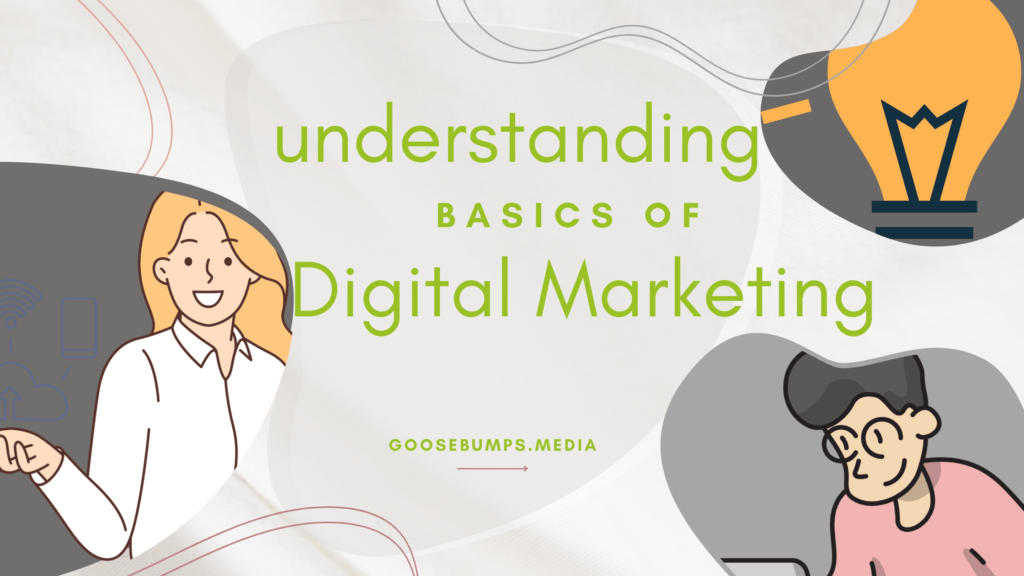
Digital marketing has become an essential part of modern business strategies, offering numerous benefits and opportunities for businesses of all sizes. In this article, we’ll delve into the basics of digital marketing, including its importance, key components, strategies, and tools for success.
Introduction to Digital Marketing
Digital marketing encompasses all online strategies and tactics used by businesses to promote their products or services, connect with their target audience, and achieve their marketing goals. Unlike traditional marketing channels, such as print ads or TV commercials, digital marketing leverages digital platforms like websites, search engines, social media, and email to reach and engage potential customers.
Importance of Digital Marketing for Businesses
In today’s digital age, having a strong online presence is crucial for businesses to remain competitive and reach their target audience effectively. Digital marketing offers several advantages, including:
- Global Reach: With digital marketing, businesses can reach a global audience without geographical limitations.
- Cost-Effective: Digital marketing channels often offer better ROI compared to traditional marketing methods.
- Targeted Advertising: Digital marketing allows businesses to target specific demographics, interests, and behaviors of their audience.
- Measurable Results: Through analytics and data-driven insights, businesses can measure the performance of their marketing campaigns in real-time.
Key Components of Digital Marketing
Digital marketing comprises various components, each playing a vital role in a comprehensive marketing strategy:
Website Design and Optimization
A well-designed and optimized website serves as the foundation of digital marketing efforts. It should be user-friendly, mobile-responsive, and optimized for search engines to attract organic traffic.
Search Engine Optimization (SEO)
SEO focuses on improving a website’s visibility on search engine results pages (SERPs) through strategies like keyword optimization, quality content creation, and backlink building.
Content Marketing
Content marketing involves creating and distributing valuable, relevant content to attract and engage the target audience. This includes blog posts, videos, infographics, and more.
Social Media Marketing
Social media platforms like Facebook, Instagram, Twitter, and LinkedIn are powerful tools for building brand awareness, engaging with customers, and driving traffic to your website.
Email Marketing
Email marketing remains a highly effective channel for nurturing leads, promoting products or services, and maintaining customer relationships through personalized campaigns and automation.
Pay-Per-Click (PPC) Advertising
PPC advertising allows businesses to bid for ad placement on search engines and other digital platforms, paying only when users click on their ads. It’s a cost-effective way to drive targeted traffic to your website.
Understanding SEO in Digital Marketing
Search Engine Optimization (SEO) plays a crucial role in digital marketing success. It involves optimizing your website and content to rank higher on search engine results pages (SERPs) and attract organic traffic.
On-Page SEO Techniques
On-page SEO focuses on optimizing individual web pages to improve their search engine rankings. This includes optimizing meta tags, headings, images, and content structure.
Off-Page SEO Strategies
Off-page SEO refers to activities outside your website that impact its search engine rankings, such as backlink building, social media engagement, and online reputation management.
Importance of Keywords
Keywords are phrases or terms that users enter into search engines to find relevant information. Incorporating targeted keywords in your content helps improve visibility and attract the right audience.
SEO Tools and Analytics
Various tools and analytics platforms, such as Google Analytics and SEMrush, provide valuable insights into website performance, keyword rankings, competitor analysis, and more, helping businesses make data-driven SEO decisions.
Content Marketing Strategies
Content marketing is about creating valuable, relevant content to attract and engage your target audience. Here are some effective content marketing strategies:
Creating High-Quality Content
Focus on creating content that educates, entertains, or solves problems for your audience. Use a mix of formats like blog posts, videos, podcasts, and infographics to keep content engaging.
Content Distribution Channels
Utilize various content distribution channels, including social media, email newsletters, guest blogging, and content syndication, to reach a wider audience and drive traffic back to your website.
Content Calendar and Planning
Develop a content calendar to organize your content creation schedule, plan thematic campaigns, and ensure consistency in publishing to maintain audience engagement.
Social Media Marketing Essentials
Social media marketing is a powerful tool for building brand awareness, engaging with your audience, and driving conversions. Here are some essential social media marketing strategies:
Platforms and Audience Targeting
Choose the right social media platforms based on your target audience demographics, interests, and engagement preferences. Tailor your content and messaging to resonate with each platform’s user base.
Engaging Content Creation
Create visually appealing and engaging content, including images, videos, polls, quizzes, and interactive posts, to capture audience attention and encourage interactions.
Social Media Analytics
Use social media analytics tools to track performance metrics like engagement, reach, clicks, and conversions. Analyze the data to optimize your social media strategy and content for better results.
Email Marketing Best Practices
Email marketing remains one of the most effective channels for driving conversions and nurturing customer relationships. Follow these best practices for successful email marketing campaigns:
Building an Email List
Grow your email list organically by offering valuable incentives like discounts, exclusive content, or freebies in exchange for sign-ups. Segment your email list based on user preferences for targeted campaigns.
Personalized Email Campaigns
Create personalized and relevant email campaigns based on user behavior, preferences, and lifecycle stages. Use automation tools to send automated drip campaigns, welcome emails, and follow-ups.
Email Automation Tools
Utilize email marketing automation tools like Mailchimp, Constant Contact, or HubSpot to streamline campaign management, automate workflows, and deliver timely, targeted messages to subscribers.
Importance of Website Optimization
A well-optimized website is crucial for providing a seamless user experience, improving conversions, and ranking higher in search engine results. Focus on the following aspects of website optimization:
User Experience (UX) Design
Design your website with a user-centric approach, focusing on intuitive navigation, fast loading times, mobile responsiveness, and clear calls-to-action (CTAs) to enhance user experience and engagement.
Mobile Responsiveness
Optimize your website for mobile devices to ensure compatibility and usability across different screen sizes and devices, improving accessibility and user satisfaction.
Conversion Rate Optimization (CRO)
Implement CRO strategies like A/B testing, optimizing landing pages, improving form fields, and reducing friction in the conversion process to increase conversions and achieve marketing goals.
Analyzing Digital Marketing Performance
Analyzing key metrics and performance indicators is essential for evaluating the effectiveness of your digital marketing efforts and making data-driven decisions. Here’s how to analyze digital marketing performance:
Key Metrics and KPIs
Monitor metrics like website traffic, conversions, click-through rates (CTR), bounce rates, engagement metrics, ROI, and customer acquisition cost (CAC) to assess campaign performance and ROI.
Tools for Analytics and Reporting
Utilize tools like Google Analytics, Google Search Console, SEMrush, Moz, HubSpot, and social media analytics platforms to track, measure, and report on digital marketing metrics, trends, and insights.
Conclusion
Understanding the basics of digital marketing is crucial for businesses looking to establish a strong online presence, reach their target audience effectively, and achieve marketing success. By implementing key strategies like SEO, content marketing, social media marketing, email marketing, and website optimization, businesses can create impactful digital marketing campaigns that drive results and deliver value to their customers.


